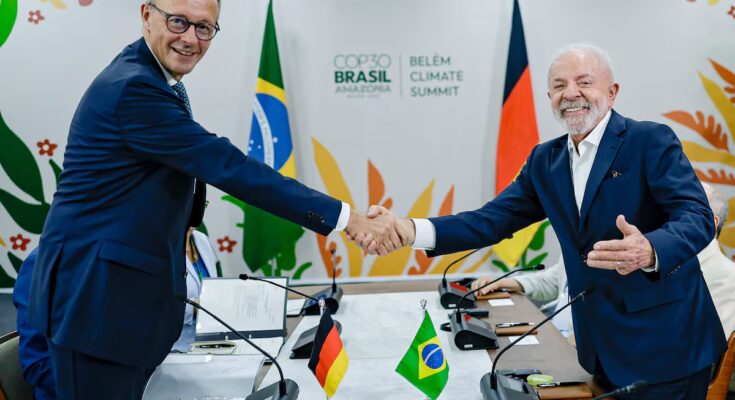A comment by Chancellor Friedrich Merz about Belém, upon his return to his homeland after visiting the city for the climate summit, angered Brazilians, including President Luiz Inácio Lula da Silva, who responded to him. Merz referenced the trip days later during a speech at the German trade congress. To praise his country, he compared it to Brazil in undiplomatic terms: “Ladies and gentlemen, we live in one of the most beautiful countries in the world. I asked some journalists who were with me in Brazil last week: Which of you would like to stay here? Nobody raised their hands. Everyone was happy that, above all, we were able to return in the night between Friday and Saturday from that place where we were, to return to Germany”, according to the transcript of his speech released by the German government.
His words went viral in Brazil. Once the controversy erupted in Brazil, Berlin tried to calm the anger in the COP30 host country. A spokesperson for the German government expressed regret when asked by the Brazilian newspaper Folha de S.Paulothat Chancellor Merz would not have had time “to travel to the edges of the Amazon to better understand the natural beauty of the region.”
On Tuesday Lula responded to the German chancellor with a defense of Belém in line with the spirit of the mayor of Berlin who invented the motto years ago Berlin is poor, but sexy: Merz “should have gone to a bar in Pará, he should have danced, he should have tried the gastronomy of Pará, because he would have realized that Berlin does not offer even 10% of the quality that the state of Pará and the city of Belém offer”.
The mayor of Rio de Janeiro, Eduardo Paes, reacted with very serious insults against the German chancellor. He called him a “Nazi” and a “tramp Hitler puppy” in a tweet on X that he later deleted. In a subsequent message he described it as “a relief”.
Holding COP30 in Belém was a personal effort of President Lula. He wanted those designing climate policy around the world, including top leaders, to get to know the Amazon closely. It was clear that it would be a logistical nightmare, that the heat, the precarious infrastructure, the exorbitant prices imposed by the hotels would cause multiple inconveniences, but the veteran president wanted to send a political message.
Belém is a city full of favelas, with 1.3 million inhabitants, located at the mouth of the Amazon River.
German Merz was one of the heavyweights who accepted the Brazilian’s invitation to participate in the presidential summit preceding COP30, which enters the decisive week. Emmanuel Macron, Pedro Sánchez and Keir Starmer were other prominent leaders of an event despised by Donald Trump, but not even attended by Xi Jinping, Narendra Modi and the Pope.
Merz had been in the spotlight of Brazilians since the days of Belém because he left the city without making his government’s financial contribution to the investment fund created by Brazil to finance the protection of tropical forests. Merz promised that he would speak to his finance minister when he returned to Berlin, but that the coalition agreed to make a contribution. “If Germany says it will be a considerable amount, it means it will be considerable,” he underlined before taking the return plane.



